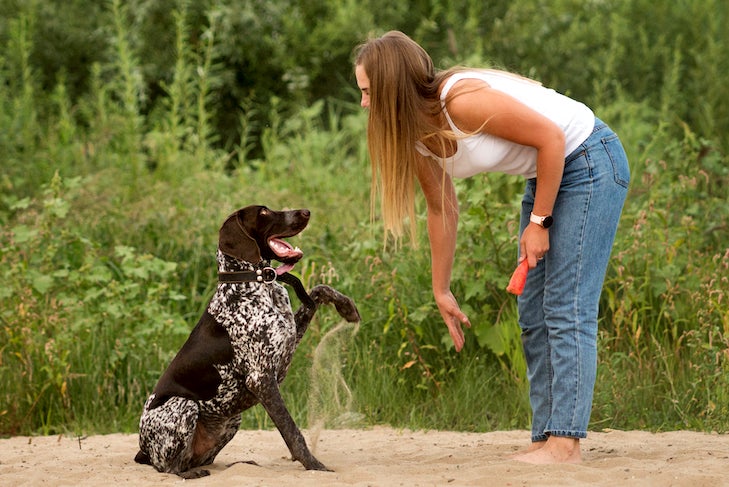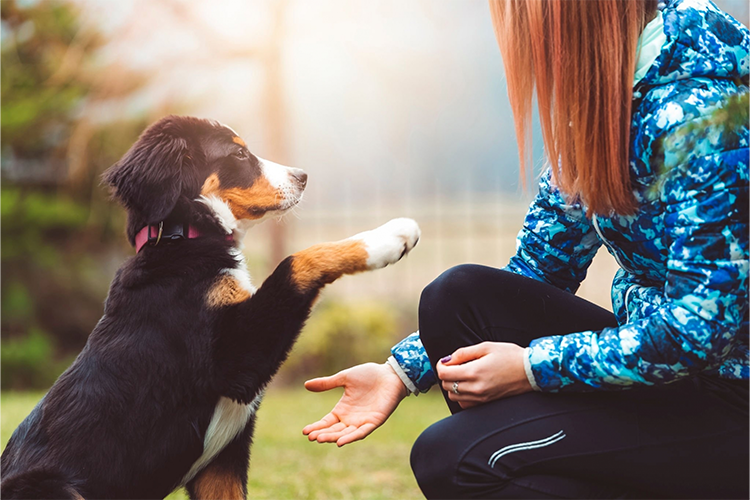Checking Out Choices for Dog Training Charlotte: What You Need to Know
Checking Out Choices for Dog Training Charlotte: What You Need to Know
Blog Article
Unlock Your Dog's Potential: Proven Pet Dog Training Approaches for Success
Efficient canine training is a nuanced process that pivots on comprehending canine behavior and employing medically backed methods. By integrating positive support, establishing clear commands, and focusing on socializing, canine proprietors can grow an effective partnership with their family pets.
Comprehending Pet Dog Habits
Comprehending dog behavior is crucial for effective training and cultivating a favorable connection between pet dogs and their proprietors. A detailed understanding of canine body language, vocalizations, and social interactions is critical for identifying their feelings and demands. Canines communicate largely with non-verbal signs; as an example, a wagging tail might indicate exhilaration, while pinned ears can signify worry or submission.

Additionally, ecological aspects play a substantial duty in shaping a canine's behavior. Changes in routine, new surroundings, or the presence of unfamiliar individuals can result in tension or anxiety in canines. Recognizing these triggers allows owners to reduce unfavorable reactions and develop suitable training techniques.
Ultimately, a deep understanding of dog actions lays the structure for effective training techniques, enhancing both habits and the overall bond between the pet dog and its proprietor. dog training charlotte. This expertise is indispensable for cultivating a well-adjusted, delighted canine companion
Favorable Reinforcement Techniques
Reliable training depends heavily on favorable reinforcement strategies, which have been revealed to produce significant lead to shaping desired habits in canines. This strategy includes rewarding a canine for showing certain behaviors, consequently enhancing the chance that these habits will certainly be repeated. Incentives can take different kinds, including deals with, praise, toys, or play, depending upon what encourages the individual pet.

It is important to slowly phase out incentives as the canine discovers the habits, transitioning to periodic reinforcement. This method preserves the behavior with time while avoiding dependency on consistent benefits. By concentrating on favorable support, fitness instructors can cultivate a relying on connection with their dogs, advertising a participating and healthy training environment that boosts general obedience and performance.
Developing Constant Commands
A fundamental aspect of successful dog training is the facility of regular commands. Uniformity in commands is essential for effective communication in between the pet and the instructor. When commands are uniform, dogs learn to link certain words with desired behaviors, which accelerates the training procedure and boosts understanding.
To develop regular commands, it is necessary that all household members make use of the same terminology and motions. If one person uses "rest" while another like this states "sit down," it can produce complication for the dog. Select clear, unique words for commands and make certain everybody entailed in the dog's training follows these selections.
Enhance commands through regular method, making certain that the pet receives ample opportunities to respond properly. When a you could try here canine effectively complies with a command, prompt favorable support needs to adhere to.
Last but not least, be patient. Establishing consistent commands takes some time and effort. With dedication and clarity, you will assist your canine develop a solid understanding of assumptions, inevitably resulting in a well-behaved companion.
Socialization and Exposure
Socializing a dog is vital for promoting a well-adjusted and positive companion. This procedure entails subjecting your canine to a variety of settings, individuals, and other pets to establish their social skills and adaptability. Early socializing, ideally in between the ages of 3 to fourteen weeks, is vital, as it lays the groundwork for a dog's future actions.
Throughout socialization, objective to provide favorable experiences in different setups, such as parks, hectic roads, and homes with other pets. Present your canine to various stimulations, including audios, sights, and scents, making sure that each encounter is rewarding. This exposure helps alleviate worry and anxiety, leading the way for a much more resilient pet dog.
Involving in controlled team play sessions with various other pets can also improve social abilities, educating your pet suitable communications and borders. Focusing on socializing will significantly add to your pet dog's total joy and actions throughout their life.
Overcoming Common Training Challenges

One more constant concern is interruption. Pet dogs might struggle to focus in active or unfamiliar settings. Slowly desensitize your pet dog to diversions by starting training in a quiet environment and slowly introducing even more stimuli as they end up being proficient (dog training charlotte). Favorable reinforcement click over here now strategies, such as deals with and praise, can keep motivation and emphasis.
Furthermore, behavioral concerns like jumping or extreme barking can become frustrating. Address these by showing alternate behaviors, such as resting smoothly when welcoming guests. Consistency and persistence are important; strengthen desired behaviors consistently and stay clear of scolding, which can lead to complication.
Finally, identify that each pet dog is special, and training timelines might differ. Dressmaker your technique to your canine's specific needs, and seek expert assistance if needed. With determination and the best techniques, getting rid of these obstacles can bring about a trained, pleased canine friend.
Verdict
Finally, opening a canine's potential necessitates a detailed approach that incorporates an understanding of canine habits, the application of positive support techniques, and the facility of constant commands. Early socialization and direct exposure to diverse settings even more enhance a canine's adaptability and confidence. By addressing common training difficulties with tailored strategies and patience, a unified and cooperative relationship in between dog and trainer can be fostered, eventually resulting in a well-behaved friend with the ability of growing in various circumstances.
Reliable dog training is a nuanced procedure that hinges on understanding canine actions and using medically backed approaches.Understanding dog actions is vital for reliable training and cultivating a favorable partnership in between dogs and their proprietors.Effective training relies heavily on positive support strategies, which have actually been revealed to produce significant outcomes in forming preferred behaviors in pets. When commands are uniform, canines discover to connect specific words with wanted behaviors, which speeds up the training process and improves understanding.
In verdict, unlocking a canine's potential demands a detailed technique that includes an understanding of canine habits, the application of favorable reinforcement methods, and the facility of regular commands.
Report this page